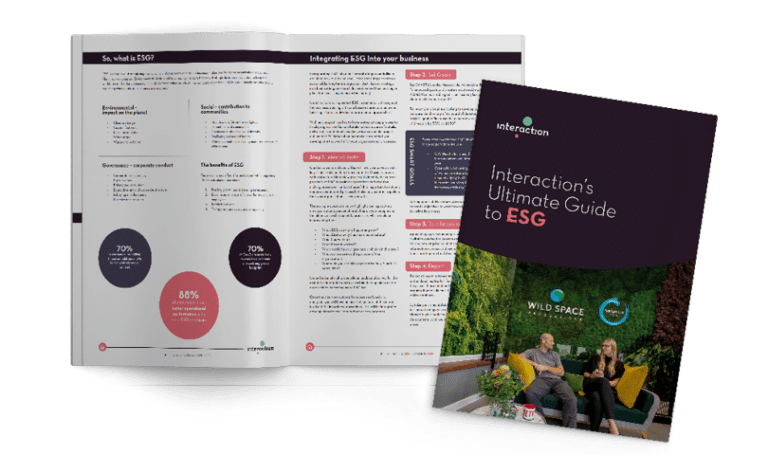Is ESG the key to attracting the best Gen Z talent?
What can companies do to make sure they’re attracting the brightest young talent? A progressive and well-defined ESG strategy not only benefits your business but makes you a top employer too.
What is ESG?
ESG is a top-level strategic imperative which informs every decision a business makes and holds the organisation accountable for delivering its ESG strategy. The three key criteria – Environmental, Social and Governance – ensure that any strategic decision is evaluated to keep the workforce and wider community in mind. As these values are built into company objectives, ESG is automatically included in any reporting when goals or milestones are reached.

Why is ESG so important to Gen Z?
Having experienced 9/11, the 2008 recession and an escalating climate crisis as formative moments in their upbringing, Gen Zers have grown up seeking stability, including in their careers. This sentiment was exacerbated for those graduating from 2019 to 2021 and having to endure one of the most volatile employment markets in the wake of the COVID-19 pandemic and associated economic uncertainty. As such, they are on track to be the most qualified generation in history – in 2018, 57% of 18 to 21-year olds were in higher education, compared to 52% of Millennials and 43% of Gen Xers at the same age.
Because of these world-shaping events, much of Gen Z feels a drive to enact positive change in the world. As the most diverse generation so far, diversity and inclusion initiatives are important to them as well as a deep concern for the climate crisis and increasing access to mental health support and resources. They seek purpose in their careers too, and working for a purpose-driven employer is key for them: 43% believe a company’s mission, purpose and values are essential, vs. 39% of the total population.

As the first generation to grow up fully emersed in the digital age, Gen Z understands the benefits of technology and the work flexibility it allows. They no longer see the value in a strict 9 to 5 role but seek the autonomy to work when it best suits them and their learning preferences. So much so that 42% of adult Gen Z workers value work-life balance, working from home and flexible holiday time as a top priority when looking for a job.
ESG is also purpose-led. By incorporating this strategic imperative into operations, businesses include ESG values into their decision-making processes, set objectives with these criteria, and accurately report on their progress. When combined with your Employer Value Proposition (EVP), an ESG-led strategy is automatically more aligned with Gen Z’s beliefs.
ESG: A Guide for Ambitious Businesses
To build the best workplace culture, attract talent and enhance employee wellbeing, get expert insight from our guide to Environment, Social and Governance (ESG).

How a strong ESG strategy can attract the best Gen Z talent
A high employee turnover rate can be an indicator of issues within an organisation: lack of progression, poor work-life balance, lack of recognition, poor company culture, toxic management styles, low remuneration and more. Any of these serve as warning signs to other existing team members as well as prospective employees.
Companies with ESG-informed business practices and policies attract top Gen Z talent as it signals to them that you are a purpose-driven, inclusive and progressive employer. Gen Z is more likely to consider employment at a company based on its ESG performance: 70% are more likely to work for a company with a strong green footprint. 86% of young talent also prefer to support or work for companies that care about the same issues as they do and 30% have left a business due to its lack of a corporate sustainability agenda.

An ESG-led business also experiences increased levels of motivation and performance, which are crucial to retain your best employees. 2021 saw the beginning of the ‘Great Resignation’, where employees across the globe left their jobs in the aftermath of the COVID-19 pandemic. It gave many the opportunity to reconsider their career paths, evaluate their work conditions, and pursue a better work-life balance. Demonstrating that you are a company that understands these vital issues, with accompanying ESG-led policies, creates satisfied and happy employees who are more productive, stay at their organisations in the long term and are more likely to strive for better results.
Gen Z’s top priority in the wake of the pandemic is climate change and, as such, are aware and distrusting of companies who greenwash. However, as part of an ESG strategy, greenwashing is avoided, by prioritising transparent, data-led reporting on business operations with ESG-influenced objectives.
Learn how to create an ESG strategy that works for your business
Gen Z is already transforming the ways in which we work by prioritising purpose in their careers, through sustainability, diversity, mental health support and work-life balance. Companies who have an ESG strategy are more likely to attract these highly-qualified digital natives and reap the benefits in the process. Learn how to integrate ESG into your business practices by downloading our guide, or call us on 01225 485 600 to have a friendly chat about your strategy.




